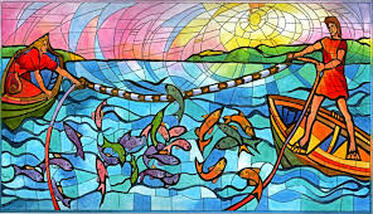
(Who remembers when I talked about my home state, Ohio, last fall? Do I have any fellow Ohioans? OK it’s time for more Ohio trivia…)
Ohio. Where you consider Kentucky “the South.” Michigan is “the North,” and during college football season, it’s also a curse word. How do you pronounce the word, W-A-S-H? We Ohioans pronounce “wash” “warsh.” With an extra “r.”
Who knows what pop is? It’s what the rest of the world calls soda, pepsi, coke, etc.
The polar vortex last week? Felt like home sweet home.
Recently I came across this statement on the internet: “24 astronauts were born in Ohio. What makes it about your state that makes people want to flee the earth?” Oh dear.
They say (in Ohio) that you can take the girl out of Ohio, but you can never take the Ohio of the girl. When I moved to New York to go to college, then seminary, I never thought I would be spending the bulk of my life and my ministry here. I slowly became a NY transplant – having left the city that launched a thousand jokes about “Mistake on the lake” “the river that caught fire” Even the mayor’s hair caught on fire, once. That’s my city. Cleveland, Ohio.
So I understand why Jesus had to leave Nazareth. “Can anything good come out of Nazareth?” his disciple Nathaniel pondered (John 1:46). Not to mention that the hometown people rejected Jesus after his first sermon – unable to accept his new status, ready to run him out of town (in this case over a cliff) causing Jesus to sadly state: “A prophet is never accepted in his hometown” (Luke 4:24). What cinched it for Jesus was the news that his cousin John had been arrested. Jesus was starting a new phase in his life – a time now of public ministry. However, Jesus didn’t choose Jerusalem, the capital, the official seat of all things Jewish to spread the Gospel’s good news. Instead he chose to go eastward, to the shore of the Sea of Galilee, or called the sea of Gennesaret, and made his home base in Capernaum, a fishing village on the northern shore. Jesus got in the boats with the fisherman. He exchanged preaching in the synagogue with teaching from the boat off the shore.
Jesus traveled along the shore of the Sea of Galilee, traveling to Jerusalem and Judea and back. He encountered all sorts of people, from Jewish zealots, conservative religious leaders, hated Samaritans and despised foreigners, loathed Romans. Jesus’ ministry along the shoreline of the Sea of Galilee was significant: Here he gave more than half of his parables and it is estimated that twenty-five of thirty-three were performed in the general Galilee area -- eighteen miracles performed in the villages near Capernaum.
The significance of the Sea of Galilee in Jesus’ ministry is highlighted by the fact that some of the first and some of the last events in his ministry involving his disciples occur here. In Luke’s passage today, Jesus tells the disciples to go out in to the deep water and let their nets out. Their catch was so great, the boat nearly sank-- (Luke 5:4) -- Peter -- falls on his knees and exclaims, “go away, Lord, for I am a sinful man.” Nonplussed, Jesus replies, “I will make you fishers of people.” At the end of Jesus’ life, an incident is recorded in the gospel of John, after Jesus was crucified and resurrected -- the disciples return home to the sea to fish. Jesus appears on the lakeshore, and again encourages them to cast their nets on the other side of the boat after a night with no catch, and the catch was huge. It is down by the sea, not so much in the synagogues or temple, that Jesus forges a new family of faith, beginning with a handful of fishermen.
The sea in general has a negative connotation throughout the Bible. To them, the sea appeared alien and threatening. The flooding waters of the sea were often a tool of God's judgment: as in the Great Flood in Noah’s time, which covered the earth. Later, when the people of Israel crossed the Red Sea, Pharaoh’s armies were drowned (Gen. 6, 7; Ex. 14). Jonah was thrown into the depths, swallowed by a large fish, because he turned disobeyed God (Jonah 2:3-6).
In the New Testament, the sea continued to symbolize chaos, evil, and evil beings. The depths of the sea are seen as the home of demons, a place called the Abyss, the home of evil spirits, according to Jewish tradition. The sea was the home of the terrible dragon, Leviathan (Isa. 27:1, 51:9-10). It was believed that someday the devil himself will rise from the sea (Rev. 13:1). Only God could control the sea (Ps. 65:5-7, 77:19, 89:9, 93:3-4; Ex. 14-15; Isa. 51:10).
In his ministry, Jesus demonstrated his authority over the sea and its destructive power. He walked on the stormy water (Mark 6:47-50; Matt. 14:22-33; John 6:16-20). He calmed the storms on the sea (Mark 4:35-41; Matt. 8:23-27; Luke 8:22-25) . He even empowered Peter, his disciple, to walk on the water (Matt. 14:28-32). These acts showed that Jesus had power over the sea and all it contained. Jesus’ teaching and training of his disciples proved that Jesus has authority over the leviathans dwelling in the dark depths of our hearts. Jesus knows how to bring calm and peace to us, he knows how to draw out the abundance of goodness in us, as he did to the Sea of Galilee.
Having grown up by the Lake Erie (can you imagine a spookier name for a body of water)—I understand the why Jesus would carry out a powerful ministry by the sea. The sea spoke to Jesus –for the sea reflected the human condition – and the sea was the perfect training grounds for Jesus’ disciples.
The people were afraid of the sea – they didn’t know how to swim -- but yet took their main sustenance from the sea. In the gospels, it is never recorded that people ate meat. Meat was a rarity. Fish was the common meal. When Jesus feeds the multitude, it is bread and fish (probably dried fish, since fresh fish was beyond the reach of the poor.) Even the rich grumbled at the cost of fish: The Greek biographer Plutarch reports a complaint that "a fish sells for more at Rome than a cow...)
Jesus took fishing practices and made them into outreach practices for people: Jesus encouraged his disciples to: “toss the net from the other side,” “go to the other side,” “go out into the deep.” He taught them how to go through the storm, to be still, to have peace in turmoil; to feed people, to teach people from the shore – the marker between the known world and unknown world. The disciples are called to give witness to how God is with us in the storms. How God is with us in the dark. In the depths of the seas. How God is with us when our nets are empty and our spirits are discouraged. The waves fomented by our fears can be stilled, in the boat, in the deep, with Jesus. We can achieve the catch, with Jesus at our side. Jesus brings out the best in us. Peter recognized this. This is why he fell on his knees, saying those heartfelt words: “Go away from me Lord, for I am a sinful man.” Peter recognized his faults, the dangerous and stormy seas within himself, in the presence of Jesus.
Jesus chose ministry by the sea, because we, like Peter, are like the sea – full of potential for new life, possibilities, nourishment, spirituality: as well as the presence of danger, demons and destruction. Jesus calls us into relationship with God. Jesus teaches us to fish for our very lives; just as he fishes us out of the deep. He teaches us to fish for the lives of others – others who live in that deep, who can’t escape the abyss on their own. They need help. We need to fish.
Our lives are a sea. Jesus has made us fishers of the deep. Fishers in the storm, in the abyss, in the fear, in the stillness, in the promise. We are all called on a journey to new homes, places and situations. We are called to the shore, where Jesus is. In the light dawning down by the sea. We are called: follow me – he says -- it is time to fish – and from the depths will come a new humanity – forged in water and spirit- of dreams that ebb and flow with the waves, where the shore, carrying the voice of Jesus, beckons the sea and turns us into fishers of people. Amen.

 RSS Feed
RSS Feed